|
|
|
Sort Order |
|
|
|
Items / Page
|
|
|
|
|
|
|
| Srl | Item |
| 1 |
ID:
075862
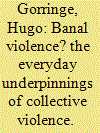

|
|
|
|
|
| Publication |
2006.
|
| Summary/Abstract |
Outbursts of collective violence are often (understandably) met by expressions of outrage or condemnation. 'How is it,' accounts muse, 'that ordinary people can commit such atrocities?' This article argues that an exclusive focus on the violent act can contribute little to our understanding. Instead, it seeks to elucidate the routine processes and actions that serve to render violence acceptable (even banal) as a mode of action. Exclusive identities and a powerful rhetoric of honour, pride, and shame persuade people that violence is either desirable or even necessary in a given context. Following Billig's account of banal nationalism, I argue that grasping these mundane day-to-day processes is essential for an understanding of collective violence. The article draws on research amongst caste-based movements in South India to support this argument.
|
|
|
|
|
|
|
|
|
|
|
|
|
|
|
|
| 2 |
ID:
146937
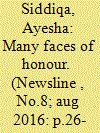

|
|
|
|
|
| Summary/Abstract |
Bibi, these days everyone is trying to commit suicide and girls have nothing to do but marry for love,” complained some of my village women recently. Speaking with them, I found that the reasons for suicide attempts were a rich mix – from poverty to dejection in love. It had become an everyday occurrence to hear about someone drinking pesticides or similar poisons readily available in agricultural areas. This trend is not limited to my village in South Punjab, but one I heard repeatedly in upper Sindh, where lawyers talked about the generosity with which judges allowed court marriages. Yet, we don’t hear of a proportionate increase in honour killings. Indeed, such brutal murders were not a known historic phenomenon in South Punjab. Women have eloped and settled or even returned home but with no lethal repercussions. Of course, there is the use of abusive language and beating up but no killing. So, I was surprised to hear about ‘honour’ in the context of Qandeel Baloch and her brutal murder by her brother. I wondered if the investigation should stop there and take the drug addict brother’s words as the only truth.
|
|
|
|
|
|
|
|
|
|
|
|
|
|
|
|
| 3 |
ID:
155376
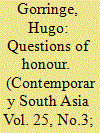

|
|
|
|
|
| Summary/Abstract |
Recent caste conflicts have revolved around discourses of honour, caste pride and shame. Although Dalit movements have been at the receiving end of the violence and have condemned the casteism underpinning it, they operate within a society in which questions of honour are highly significant. Dalit women activists are trapped in an unenviable position within the twin structures of caste and patriarchy, both of which speak to debates about group boundaries and honour. Taking the recent violence as its starting point, this paper draws on interviews with and observations of Dalit women in the Viduthalai Chiruthaigal Katchi (Liberation Panther Party) in Tamil Nadu to chart how discourses of honour both facilitate and constrain their capacity to act. For all the party’s emphasis on women’s rights, women activists face an uphill struggle to secure recognition, respect and responsiveness both within the party as well as wider society.
|
|
|
|
|
|
|
|
|
|
|
|
|
|
|
|
| 4 |
ID:
145460
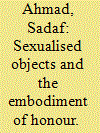

|
|
|
|
|
| Summary/Abstract |
A number of popular Pakistani films feature rapes and attempted rapes, supporting a rape culture that needs to be problematised. I analyse these films and demonstrate that this gendered form of violence serves multiple functions, providing the audience with gratuitous entertainment, developing the narrative and/or punishing women. These functions, which are by no means unique to Pakistani film, incite, excuse and normalise sexual aggression, so supporting a strong rape culture. I also draw attention to more culturally specific honour-based ideologies in these films and demonstrate how these can also encourage and legitimise rape. This leads to a more holistic understanding of what this local rape culture entails. I show that the mainstream film industry has consistently portrayed this culture and suggest that filmmakers’ allegiance to such narratives has therefore amplified the promotion and reproduction of a rape culture in Pakistani society.
|
|
|
|
|
|
|
|
|
|
|
|
|
|
|
|
| 5 |
ID:
107550
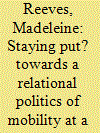

|
|
|
|
|
| Publication |
2011.
|
| Summary/Abstract |
Most research on labour migration from Central Asia has explored the motivations and strategies of those who move. Comparatively less attention has been given to the experience of family members who stay behind. This paper draws on ethnographic research amongst the wives of migrant husbands in a site of gendered out-migration in eastern Uzbekistan to explore diverse experiences of 'staying put'. Whilst spousal absence is experienced by some women as expanding the possibilities for social and spatial mobility, for others it can exacerbate the degree of control exerted by in-laws. Through this ethnography the author argues for a relational politics of mobility: that is, attention to the ways in which the movement of some can constrain (or compel) the mobility of others. Gendered out-migration is both embedded in, and transforms, the domestic organization of honour (nomus), in ways that are socially consequential. In Central Asia, the author argues, a richer understanding of labour migration can be gained by bringing different scales of movement into the same analytical frame and by attending ethnographically to the habitual production of place.
|
|
|
|
|
|
|
|
|
|
|
|
|
|
|
|
|
|
|
|
|